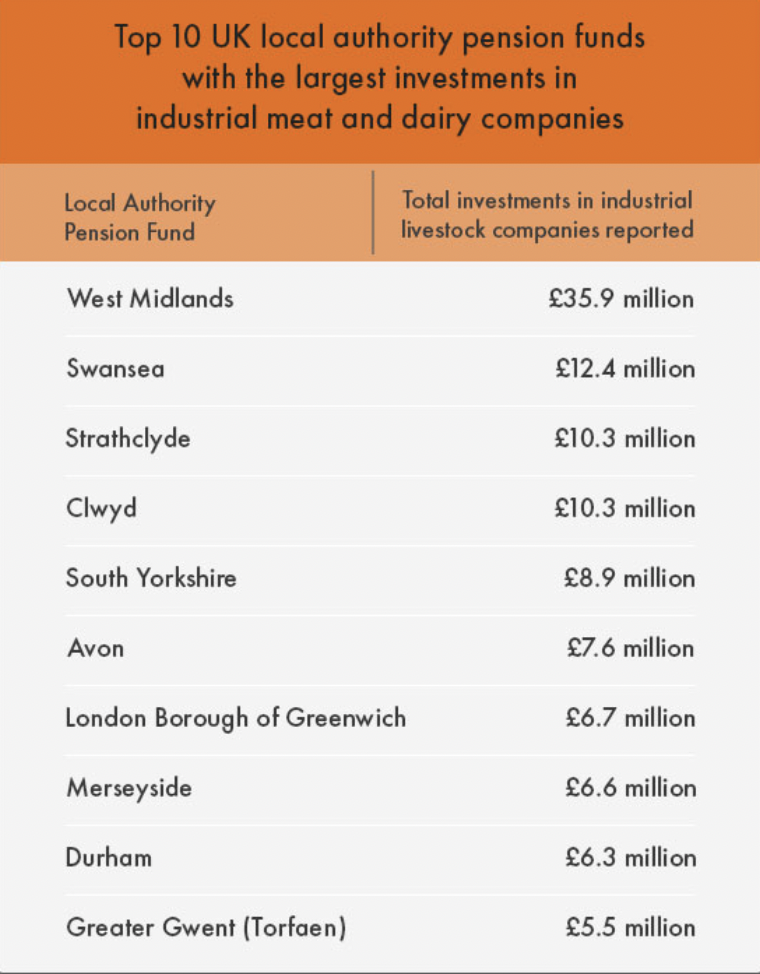Several Local Government Pension Scheme funds have come under pressure from animal rights activists over their exposure to factory farming, facing demands for divestment.
LGPS funds have £238m tied up in industrial livestock companies, according to new research by World Animal Protection, which estimates that a further £73m of investments have not been fully reported.
The revelations, which were first reported by The Independent, were secured via freedom of information requests submitted by the activists to UK local authorities.
Almost half of the reported sum is held by 10 schemes alone, which together had £110.6m of investments in industrial livestock businesses.
It’s entirely possible these holdings are in intermediated pooled investment vehicles, in which case a scheme’s ability to direct how money is or isn’t invested is restricted to the point of being non-existent
Richard Butcher, PTL
This is despite Birmingham City Council, Coventry City Council, Glasgow City Council and Swansea City Council, which have their pensions held by these funds, having all declared a state of climate emergency.
According to the report, Swansea had the highest proportion of its investments in industrial livestock, standing at 0.6 per cent.
A spokesperson for the Swansea scheme said that these investments are part of a fund managed by a partner organisation, the WPP global opportunities fund.
"They have recently adopted a low carbon approach to their holdings which is similar to the approach we have been taking," they said. "This means that from this year, their holdings in carbon intensive industries like animal products businesses will decrease."
The West Midlands scheme, meanwhile, had the largest investment in these companies, worth £35.9m, according to the report.
A spokesperson for the West Midlands fund said that the fund is seeking clarification from the report authors, querying the figure. They said that the fund is "fully committed to aligning with the goals of the Paris Agreement and net zero ambition by 2050 or sooner".

Source: World Animal Protection
An average of just 0.1 per cent of the schemes’ investments was in industrial livestock, which the activists argued should make it easier for these funds to divest.
Richard Butcher, managing director of PTL, challenged this point.
“A low allocation certainly doesn’t mean it’s easy to disinvest. Very few schemes invest directly in the market. Even fewer invest all of their assets direct to market,” he noted.
“It’s entirely possible these holdings are in intermediated pooled investment vehicles, in which case a scheme’s ability to direct how money is or isn’t invested is restricted to the point of being non-existent.”
Around two-thirds of local authorities’ investments in industrial livestock are conducted through indirect investment vehicles, including actively managed and passive investment funds, the report stated.
“The only real leverage they have is to disinvest, which would mean giving up everything else in the vehicle,” Butcher observed.
Much of the investments have also been made through bonds, the activists’ report acknowledges, ruling out engagement with the companies.
It also noted that the shares in most of these businesses are concentrated among a few individuals, limiting direct shareholders’ ability to influence the way the companies are run.
A council spokesperson for the Royal Borough of Greenwich said: “The council’s pension fund is overseen by a pension fund investment and administration panel. In September 2020, the panel agreed to a new investment strategy and asset allocation, including a section on a new low-carbon approach.
Investment managers’ boardrooms lagging on ESG
Investment managers lack environmental, social and governance experience at boardroom level, with less than a quarter having mandatory training for board members, according to new research.
“The pension fund’s exposure to industrial livestock stocks is mainly through indirect exposure via indices such as the FTSE 100 index. As part of the new strategy, the panel agreed to assess and reduce the fund’s investment in carbon-intensive areas.”
Other local authorities have been approached for comment.
Earlier this week, consultancy LCP published research suggesting that investment managers’ board members, many of whom are tasked with handling LGPS investments, are falling behind on environmental, social and governance standards.
While 69 per cent of these companies have compulsory training on responsible investment for staff, less than a quarter have similar training for board members.

























